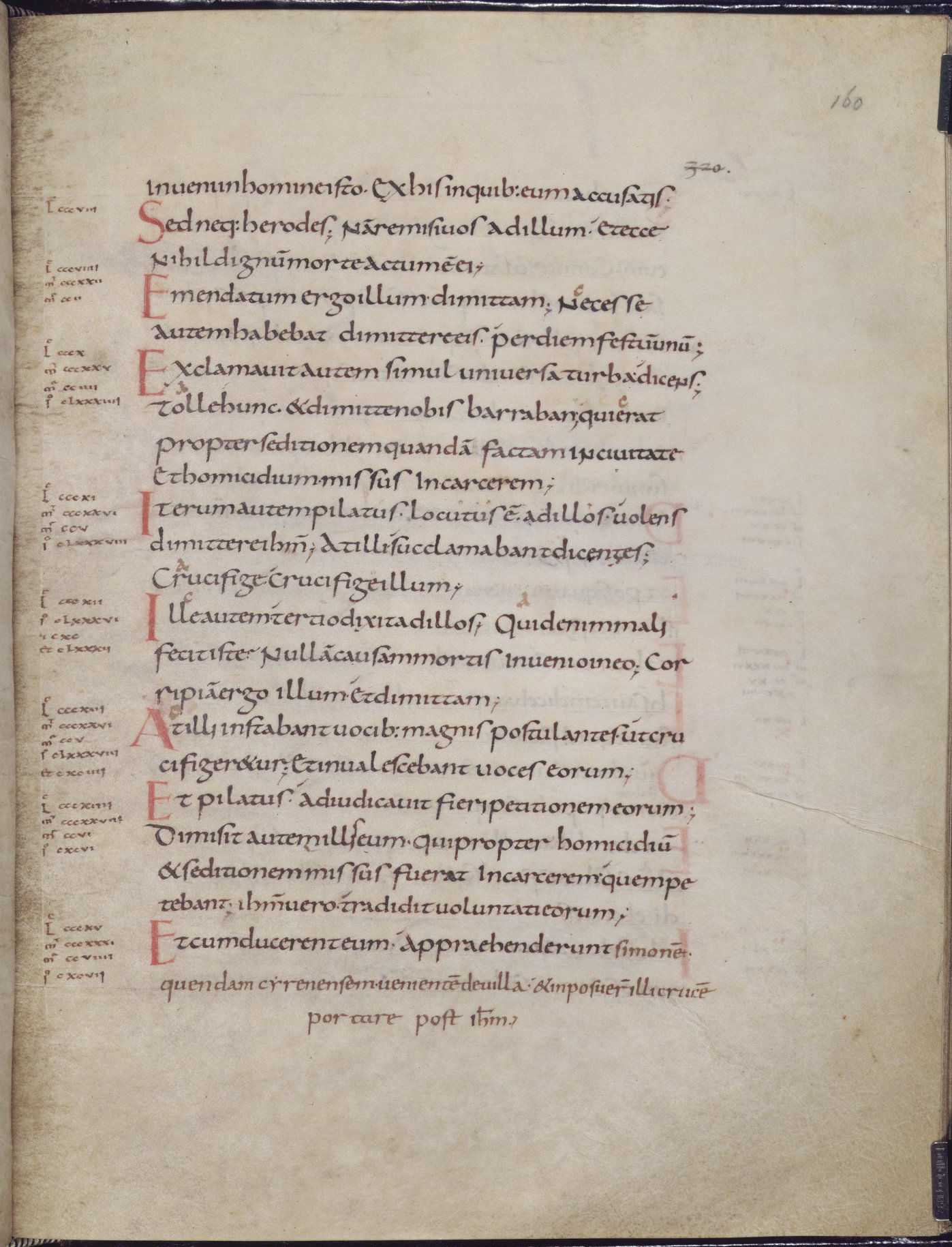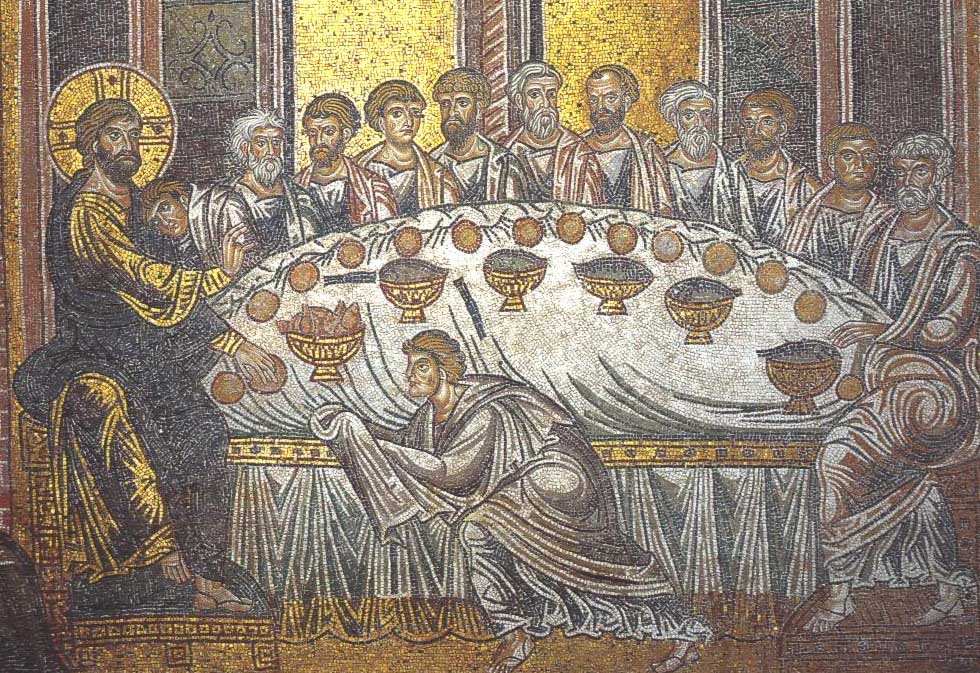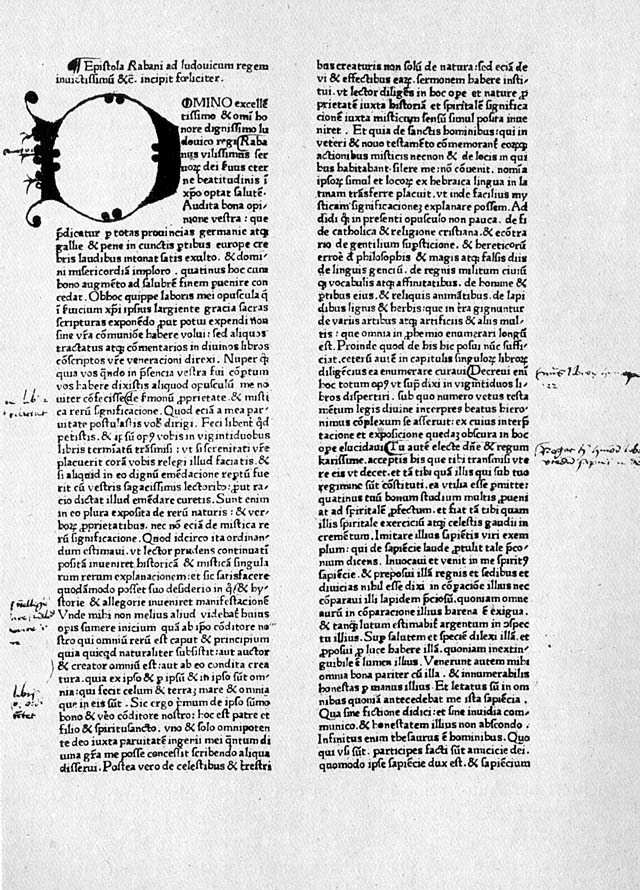|
Paschasius Radbertus
Paschasius Radbertus (785–865) was a Carolingian theologian and the abbot of Corbie, a monastery in Picardy founded in 657 or 660 by the queen regent Bathilde with a founding community of monks from Luxeuil Abbey. His most well-known and influential work is an exposition on the nature of the Eucharist written around 831, entitled ''De Corpore et Sanguine Domini''. He was canonized in 1073 by Pope Gregory VII. His feast day is April 26. His works are edited in ''Patrologia Latina'' vol. 120 (1852) and his important tract on the Eucharist, ''De Corpore et Sanguine Domini'', in a 1969 edition by B. Paulus, published by Brepols (Corpus Christianorum, Continuatio Mediaevalis 16). Life Paschasius was an orphan left on the steps of the convent of Notre-Dame de Soissons. He was raised by the nuns there, and became very fond of the abbess, Theodrara. Theodrara was sister of Adalard of Corbie and Wala of Corbie, two monks whom he admired greatly. At a fairly young age, Paschasius le ... [...More Info...] [...Related Items...] OR: [Wikipedia] [Google] [Baidu] |
Carolingian Renaissance
The Carolingian Renaissance was the first of three medieval renaissances, a period of cultural activity in the Carolingian Empire. It occurred from the late 8th century to the 9th century, taking inspiration from the Christian Roman Empire of the fourth century. During this period, there was an increase of literature, writing, visual arts, architecture, music, jurisprudence, liturgical reforms, and scriptural studies. The movement occurred mostly during the reigns of Carolingian rulers Charlemagne and Louis the Pious. It was supported by the scholars of the Carolingian court, notably Alcuin of York. Charlemagne's ''Admonitio generalis'' (789) and '' Epistola de litteris colendis'' served as manifestos. The effects of this cultural revival were mostly limited to a small group of court '' literati''. According to John Contreni, "it had a spectacular effect on education and culture in Francia, a debatable effect on artistic endeavors, and an unmeasurable effect on what mattere ... [...More Info...] [...Related Items...] OR: [Wikipedia] [Google] [Baidu] |
Last Supper
Image:The Last Supper - Leonardo Da Vinci - High Resolution 32x16.jpg, 400px, alt=''The Last Supper'' by Leonardo da Vinci - Clickable Image, Depictions of the Last Supper in Christian art have been undertaken by artistic masters for centuries, Leonardo da Vinci's late-1490s mural painting in Milan, Italy, being the best-known example. ''(Clickable image—use cursor to identify.)'' poly 550 2550 750 2400 1150 2300 1150 2150 1200 2075 1500 2125 1525 2300 1350 2800 1450 3000 1700 3300 1300 3475 650 3500 550 3300 450 3000 Bartholomew poly 1575 2300 1625 2150 1900 2150 1925 2500 1875 2600 1800 2750 1600 3250 1425 3100 1400 2800 1375 2600 James Minor poly 1960 2150 2200 2150 2350 2500 2450 2575 2375 2725 2375 2900 2225 3100 2225 3225 1600 3225 1825 2700 1975 2450 1925 2300 Andrew poly 2450 2575 2775 2500 2700 2650 2800 2700 2600 3000 2600 3250 2300 3250 2200 3200 2300 3000 Peter poly 2750 2500 2950 2400 3125 2600 3175 2700 3300 2850 3700 3200 3750 3200 3650 3350 3400 3200 3000 3 ... [...More Info...] [...Related Items...] OR: [Wikipedia] [Google] [Baidu] |
The Book Of Job
The Book of Job (; hbo, אִיּוֹב, ʾIyyōḇ), or simply Job, is a book found in the Ketuvim ("Writings") section of the Hebrew Bible (Tanakh), and is the first of the Poetic Books in the Old Testament of the Christian Bible. Scholars are generally agreed that it was written between the 7th and 4th centuries BCE. It addresses theodicy, why God permits evil in the world, through the experiences of the eponymous protagonist. Job is a wealthy and God-fearing man with a comfortable life and a large family; God, having asked Satan ( hbo, הַשָּׂטָן, haśśāṭān, , label=none) for his opinion of Job's piety, decides to take away Job's wealth, family and material comforts, following Satan's accusation that if Job were rendered penniless and without his family, he would turn away from God. Structure The Book of Job consists of a prose prologue and epilogue narrative framing poetic dialogues and monologues. It is common to view the narrative frame as the original core ... [...More Info...] [...Related Items...] OR: [Wikipedia] [Google] [Baidu] |
Acts Of St
The Acts of the Apostles ( grc-koi, Πράξεις Ἀποστόλων, ''Práxeis Apostólōn''; la, Actūs Apostolōrum) is the fifth book of the New Testament; it tells of the founding of the Christian Church and the spread of its message to the Roman Empire. It gives an account of the ministry and activity of Christ's apostles in Jerusalem and other regions, after Christ's death, resurrection, and ascension. Acts and the Gospel of Luke make up a two-part work, Luke–Acts, by the same anonymous author. It is usually dated to around 80–90 AD, although some scholars suggest 90–110. The first part, the Gospel of Luke, tells how God fulfilled his plan for the world's salvation through the life, death, and resurrection of Jesus of Nazareth. Acts continues the story of Christianity in the 1st century, beginning with the ascension of Jesus to Heaven. The early chapters, set in Jerusalem, describe the Day of Pentecost (the coming of the Holy Spirit) and the growth of the chur ... [...More Info...] [...Related Items...] OR: [Wikipedia] [Google] [Baidu] |
Jerome
Jerome (; la, Eusebius Sophronius Hieronymus; grc-gre, Εὐσέβιος Σωφρόνιος Ἱερώνυμος; – 30 September 420), also known as Jerome of Stridon, was a Christian priest, confessor, theologian, and historian; he is commonly known as Saint Jerome. Jerome was born at Stridon, a village near Emona on the border of Dalmatia and Pannonia. He is best known for his translation of the Bible into Latin (the translation that became known as the Vulgate) and his commentaries on the whole Bible. Jerome attempted to create a translation of the Old Testament based on a Hebrew version, rather than the Septuagint, as Latin Bible translations used to be performed before him. His list of writings is extensive, and beside his biblical works, he wrote polemical and historical essays, always from a theologian's perspective. Jerome was known for his teachings on Christian moral life, especially to those living in cosmopolitan centers such as Rome. In many cases, he ... [...More Info...] [...Related Items...] OR: [Wikipedia] [Google] [Baidu] |
Cistercian
The Cistercians, () officially the Order of Cistercians ( la, (Sacer) Ordo Cisterciensis, abbreviated as OCist or SOCist), are a Catholic religious order of monks and nuns that branched off from the Benedictines and follow the Rule of Saint Benedict, as well as the contributions of the highly-influential Saint Bernard of Clairvaux, known as the Latin Rule. They are also known as Bernardines, after Saint Bernard himself, or as White Monks, in reference to the colour of the "cuculla" or cowl (choir robe) worn by the Cistercians over their habits, as opposed to the black cowl worn by Benedictines. The term ''Cistercian'' derives from ''Cistercium,'' the Latin name for the locale of Cîteaux, near Dijon in eastern France. It was here that a group of Benedictine monks from the monastery of Molesme founded Cîteaux Abbey in 1098, with the goal of following more closely the Rule of Saint Benedict. The best known of them were Robert of Molesme, Alberic of Cîteaux and the English mon ... [...More Info...] [...Related Items...] OR: [Wikipedia] [Google] [Baidu] |
Humanistic
Humanism is a philosophical stance that emphasizes the individual and social potential and agency of human beings. It considers human beings the starting point for serious moral and philosophical inquiry. The meaning of the term "humanism" has changed according to the successive intellectual movements that have identified with it. During the Italian Renaissance, ancient works inspired scholars in various Italian cities, giving rise to a movement now called Renaissance humanism. With Enlightenment, humanistic values were re-enforced by the advances in science and technology, giving confidence to humans in their exploration of the world. By the early 20th century, organizations solely dedicated to humanism flourished in Europe and the United States, and have since expanded all over the globe. In the current day, the term generally refers to a focus on human well-being and advocates for human freedom, autonomy, and progress. It views humanity as responsible for the promoti ... [...More Info...] [...Related Items...] OR: [Wikipedia] [Google] [Baidu] |
Helen Of Troy
Helen of Troy, Helen, Helena, (Ancient Greek: Ἑλένη ''Helénē'', ) also known as beautiful Helen, Helen of Argos, or Helen of Sparta, was a figure in Greek mythology said to have been the most beautiful woman in the world. She was believed to have been the daughter of Zeus and Leda, and was the sister of Clytemnestra, Castor and Pollux, Philonoe, Phoebe and Timandra. She was married to King Menelaus of Sparta "who became by her the father of Hermione, and, according to others, of Nicostratus also." The usual tradition is that after the goddess Aphrodite promised her to Paris in the Judgement of Paris, she was seduced by him and carried off to Troy. This resulted in the Trojan War when the Achaeans set out to reclaim her. Another ancient tradition, told by Stesichorus, tells of how "not she, but her wraith only, had passed to Troy, while she was borne by the Gods to the land of Egypt, and there remained until the day when her lord Menelaus, turning aside on the h ... [...More Info...] [...Related Items...] OR: [Wikipedia] [Google] [Baidu] |
Cicero
Marcus Tullius Cicero ( ; ; 3 January 106 BC – 7 December 43 BC) was a Roman statesman, lawyer, scholar, philosopher, and academic skeptic, who tried to uphold optimate principles during the political crises that led to the establishment of the Roman Empire. His extensive writings include treatises on rhetoric, philosophy and politics, and he is considered one of Rome's greatest orators and prose stylists. He came from a wealthy municipal family of the Roman equestrian order, and served as consul in 63 BC. His influence on the Latin language was immense. He wrote more than three-quarters of extant Latin literature that is known to have existed in his lifetime, and it has been said that subsequent prose was either a reaction against or a return to his style, not only in Latin but in European languages up to the 19th century. Cicero introduced into Latin the arguments of the chief schools of Hellenistic philosophy and created a Latin philosophical vocab ... [...More Info...] [...Related Items...] OR: [Wikipedia] [Google] [Baidu] |
Zeuxis (painter)
Zeuxis (; grc-gre, Ζεῦξις) (of Heraclea) was a Greek painter who flourished during the 5th century BCE and became famous for his ability to imitate nature and especially still life with his art. Life and work Zeuxis was an innovative Greek painter. Although his paintings have not survived, historical records state they were known for their realism, small scale, novel subject matter, and independent format. His technique created volumetric illusion through manipulating light and shadow, a change from the usual method of filling in shapes with flat color. Preferring small scale panels to murals, Zeuxis also introduced genre subjects (such as still life) into painting. He contributed to the composite method of composition, and may have originated an approach to, and thus influenced the concept of the ideal form of the nude, as described by art historian Kenneth Clark. As the story goes, according to Cicero, Zeuxis could not find a woman beautiful enough to pose as Helen of ... [...More Info...] [...Related Items...] OR: [Wikipedia] [Google] [Baidu] |
Real Presence Of Christ In The Eucharist
The real presence of Christ in the Eucharist is the Christian doctrine that Jesus Christ is present in the Eucharist, not merely symbolically or metaphorically, but in a true, real and substantial way. There are a number of Christian denominations that teach that Christ is truly present in the Eucharist, including Catholicism, Eastern Orthodoxy, Oriental Orthodoxy, the Church of the East, the Moravian Church, Lutheranism, Anglicanism, Methodism, Irvingism and Reformed Christianity. The differences in the teachings of these Churches primarily concern "the mode of Christ's presence in the Lord’s Supper". The Real Presence is rejected or interpreted in light of "remembrance" (per certain translations of the New Testament) by other Protestants, including General Baptists, Anabaptists, the Plymouth Brethren, some non-denominational Christian churches, as well as those identifying with liberal Christianity, segments of the Restoration Movement, and Jehovah's Witnesses ... [...More Info...] [...Related Items...] OR: [Wikipedia] [Google] [Baidu] |
Rabanus Maurus
Rabanus Maurus Magnentius ( 780 – 4 February 856), also known as Hrabanus or Rhabanus, was a Frankish Benedictine monk, theologian, poet, encyclopedist and military writer who became archbishop of Mainz in East Francia. He was the author of the encyclopaedia ''De rerum naturis'' (''"On the Natures of Things"''). He also wrote treatises on education and grammar and commentaries on the Bible. He was one of the most prominent teachers and writers of the Carolingian age, and was called "Praeceptor Germaniae", or "the teacher of Germany". In the most recent edition of the Roman Martyrology ('' Martyrologium Romanum'', 2004, pp. 133), his feast is given as 4 February and he is qualified as a Saint ('sanctus'). Life Rabanus was born of noble parents in Mainz. The date of his birth remains uncertain, but in 801 he was ordained a deacon at Benedictine Abbey of Fulda in Hesse, where he had been sent to school and had become a monk. At the insistence of Ratgar, his abbot, he went t ... [...More Info...] [...Related Items...] OR: [Wikipedia] [Google] [Baidu] |



.jpg)





